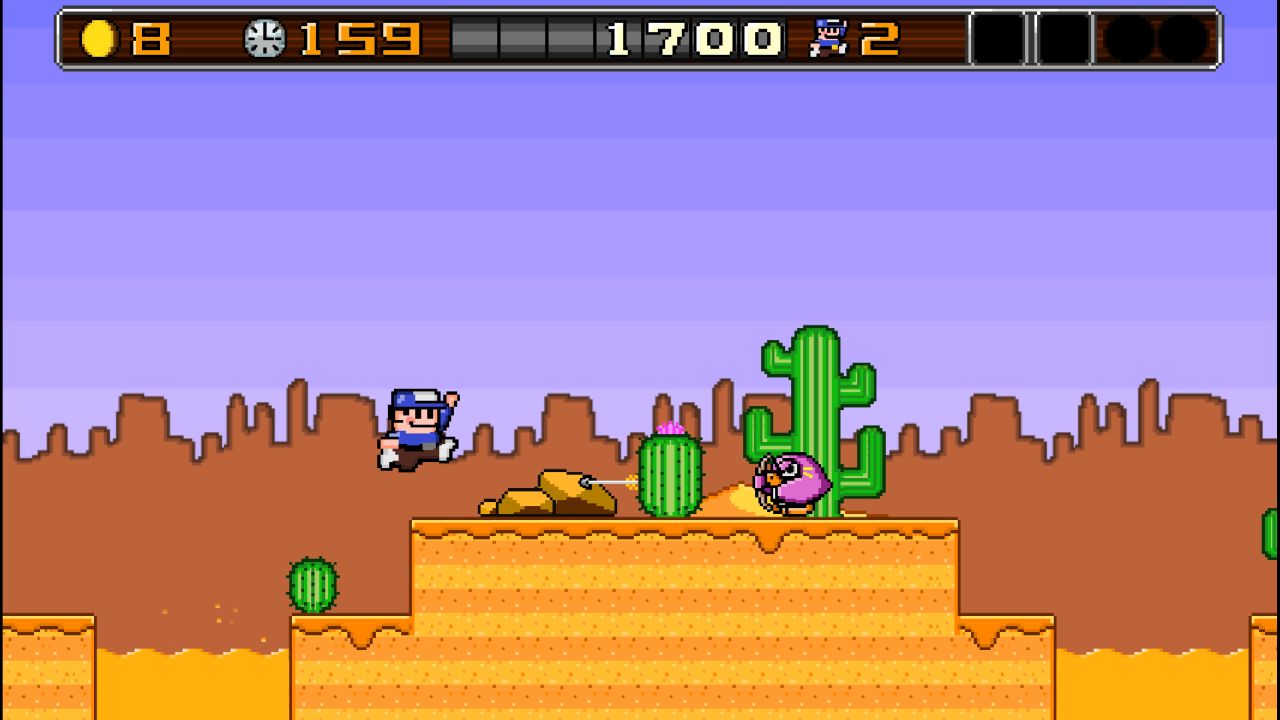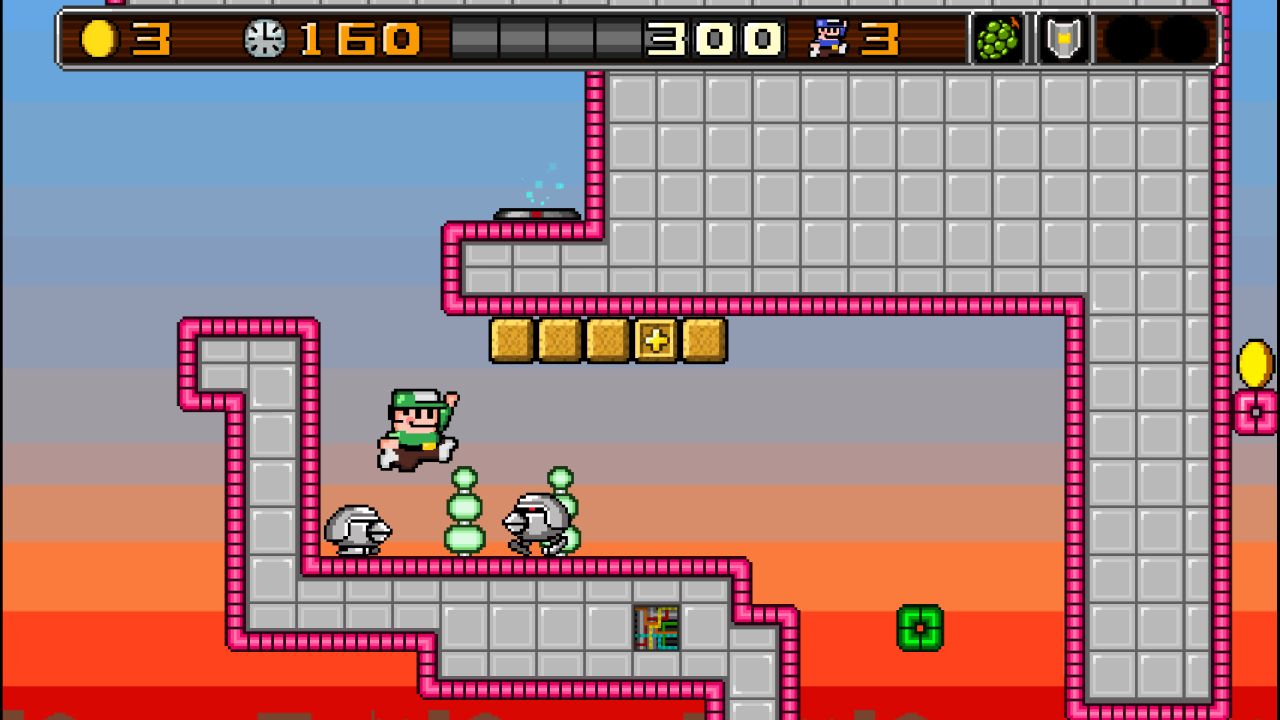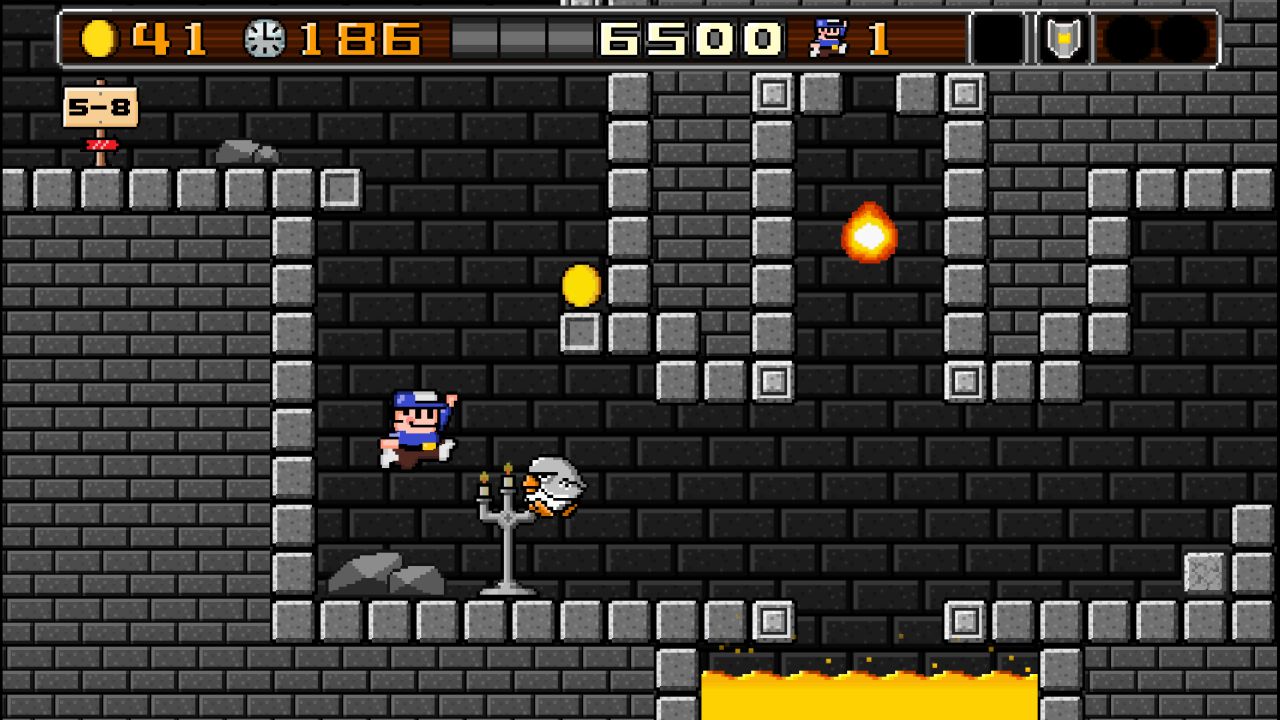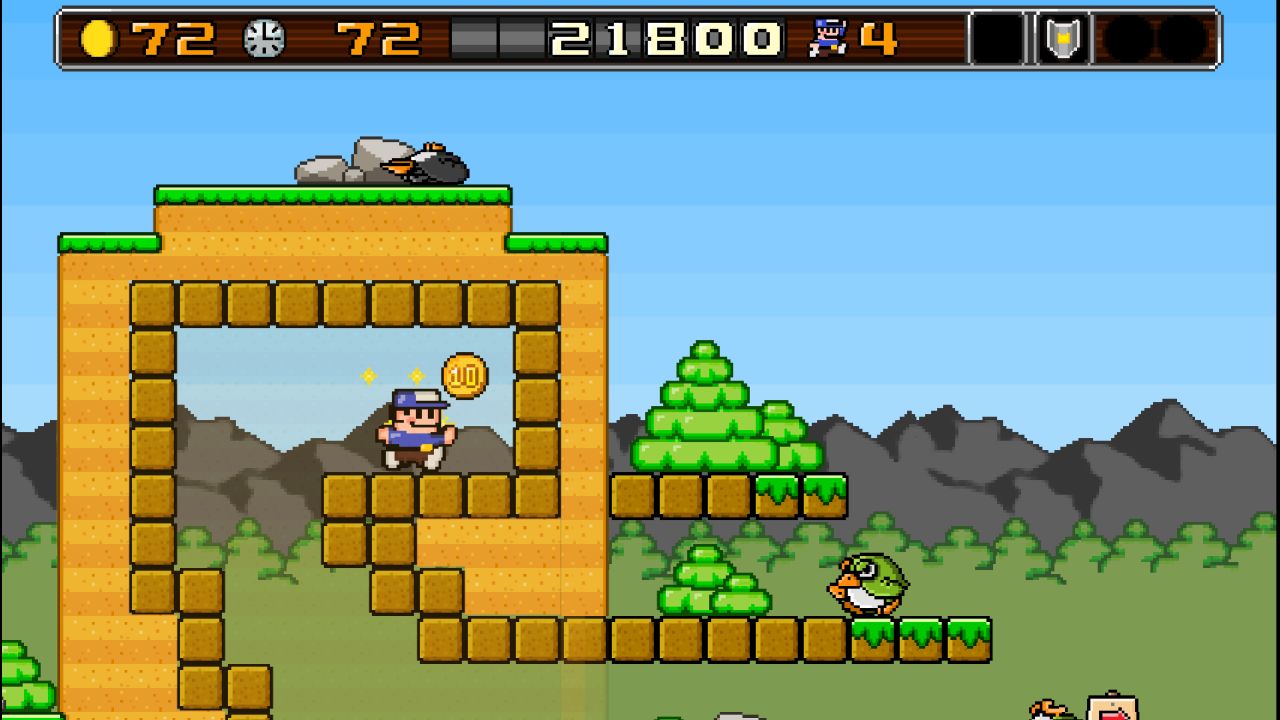8-Bit Boy Review
If there’s one thing I’ve learned from growing up with video games, it’s to keep my fat mouth shut when it comes to predicting what will and won’t be a success on the gaming market. I laughed at the Xbox when it first came out (What was Microsoft thinking? They were competing with their very own PC-gaming market!). And of course, lest we forget, I chuckled condescendingly at the idea that the iPhone would ever be able to generate revenue from casual games.

That’s why I hesitate to giggle at the idea of browser based games. There’s plenty to complain about: all your saves are erased whenever you wipe your web history, and the game icon takes up space on your normally-blank starting page. But then, the game also nicely pauses whenever you switch tabs. It’s a little like a flash game, only deeper and with a fair amount of content, and always available offline. 8-Bit Boy is meant to be something of an experiment in the browser-based field, showcasing what it can do and giving you a reason to try this odd little corner of the casual gaming market. Right from the get-go, the game panders to the nostalgic gamer, with a storyline about an average Joe who, when rummaging through the closet, stumbles on his classic suspiciously-brandless gaming console and decides to play through an 8-bit platformer just for old time’s sake. Our fearless hero then gets magically sucked into the game (light symbollism, anyone?) and has to battle his way from left to right in that classic 80s style of platforming. From the first moment, the game feels eerily familiar: gathering gold coins, hitting blocks to get the fireball powerup, sprouting hidden beanstalks to get to hidden caches… it’s a deliberate mimic of the original Super Mario Brothers through and through. Whether you love this idea or hate it will be up to you, but I’ll get deeper into this question later in this review.
If you don’t remember the glory days of eight bit platforming (or if, poor soul, you’re too young to have experienced them), 8-Bit Boy wastes no time in reminding you of what you’re missing: the old platformers were HARD. Bottomless pits are everywhere, low ceilings block your jumps, and your character can only get hit three times before dying (and that’s only if you’re very good about picking up all the power-ups along the way). When it was first released, 8-Bit Boy had no difficulty setting, making the learning curve an absolute pain to deal with: I was honestly stuck on the first two levels for quite some time, since game saves must be discovered and earned, rather than being automatic. An update wisely allowed an ‘Easy Mode’ where the game saves at the end of each level and more time is granted for level exploration. Not that a true gamer would stoop to such crutches, but it’s the thought that counts.

The game’s inherent difficulty does raise some issues though, since the makers are obviously trying to mimic their late-80s predecessors. Half of the difficulties make you wonder whether the move away from early platforming mechanics was simply a sign of the gaming industry growing up, rather than a babying-down. For example, the aforementioned earned game saves are hidden throughout the levels, but you wouldn’t know about them unless you’d read through the included manual, because the game doesn’t organically reveal its mechanics the way that most modern games do. Get it? It’s bad game design! Just like the classic games used to have! Or take the generous over-slide that your character has (that’s where your character will always slide a little bit further than he jumps, making it very easy to fall off edges) .
This feels for all the world like unresponsive controls, and even if this was what eight bit games were like, I certainly don’t remember Mario being THAT difficult to control. That said, the other difficulties (like all that one-hit-kill lava) are simply being true to the memories of what the second Golden Age of video games was like. I’ve heard plenty of gamers say that games have gotten ridiculously easy in the past two decades, and I believe it: here’s a game that will (horror of horrors!) actually make you stop and work through a difficult level until your skill increases enough to beat it.
Too often, however, 8-Bit Boy feels more like a Mario clone, rather than a Mario parody. Instead of building on a nostalgic base and expanding into new and interesting territory, 8-Bit Boy seems content to simply copy Super Mario Brothers and hope that the memories alone will keep you entertained. An example of this is in the art style: yes, everything is gloriously rendered in 8-bit graphics, and your main character looks just like Mario (with a color change); but your enemies are rather uninspired: some mean-looking birds, some bats and snakes, and a few amorphous blobs. Locals are similarly flat, with nigh-blank backgrounds and very generic blocks as your main source of platforms and interaction. Again, some players might be tempted to say “It’s supposed to be bland, just like the old games!” But falling into this trap doesn’t give the old Super Mario Brothers credit where it’s due: the Mario world of turtles, mushrooms, and pipe-plants is zany and fantastic, and even if it didn’t make a lot of sense, it kept you entertained.

What really gets me about this game isn’t that it’s a Mario Brothers rip-off: it’s that we’ve already seen how to properly parody or reimagine the legacy that SMB gave us. Super Meat Boy had deliberate Mario references, but it had a drastically different and modern approach to action platforming, as well as its own unique visual style. Braid referenced Mario, but it did so with the intent of deconstructing the genre and paying light homage to its predecessors. 8-Bit Boy is just… Super Mario Brothers, only not as good. It doesn’t so much mimic the feeling of replaying a classic game, as it mimics the feeling of replaying that awful second-rate cash-in that your uncle bought you for Christmas one year.

It’s just not enough. The moral of 8-Bit Boy is that the classic platformers of our childhood can (and should!) be ported into flash versions so they can be saved for the ages and played by the veterans. The problem is that gamers already knew all this. We don’t need a reminder that this is possible more than we need the actual games themselves. What’s worse, there’s a second ‘moral’ of 8-Bit Boy that almost contradicts it’s only source of appeal; the game relies heavily on a sense of nostalgia, but by including the weaknesses of the old gaming style along with the strengths, gamers might just be reminded of why it was a good thing that video games grew beyond their eight bit roots. Games today don’t just have better graphics: they have better gameplay, writing, and visual style. By showcasing the weaknesses of early platforming, 8-Bit Boy is like a deliberately schlocky science fiction film bent on reminding you of how awful 60’s science fiction was. Well, congratulations, I suppose, you’ve certainly convinced me.
